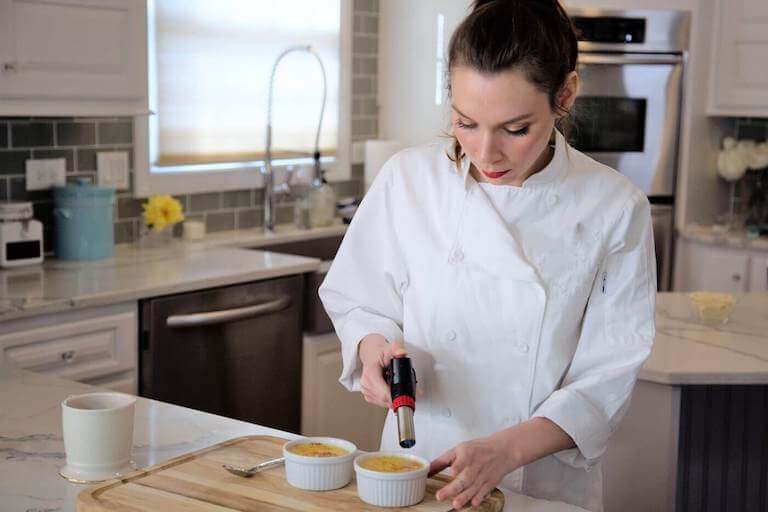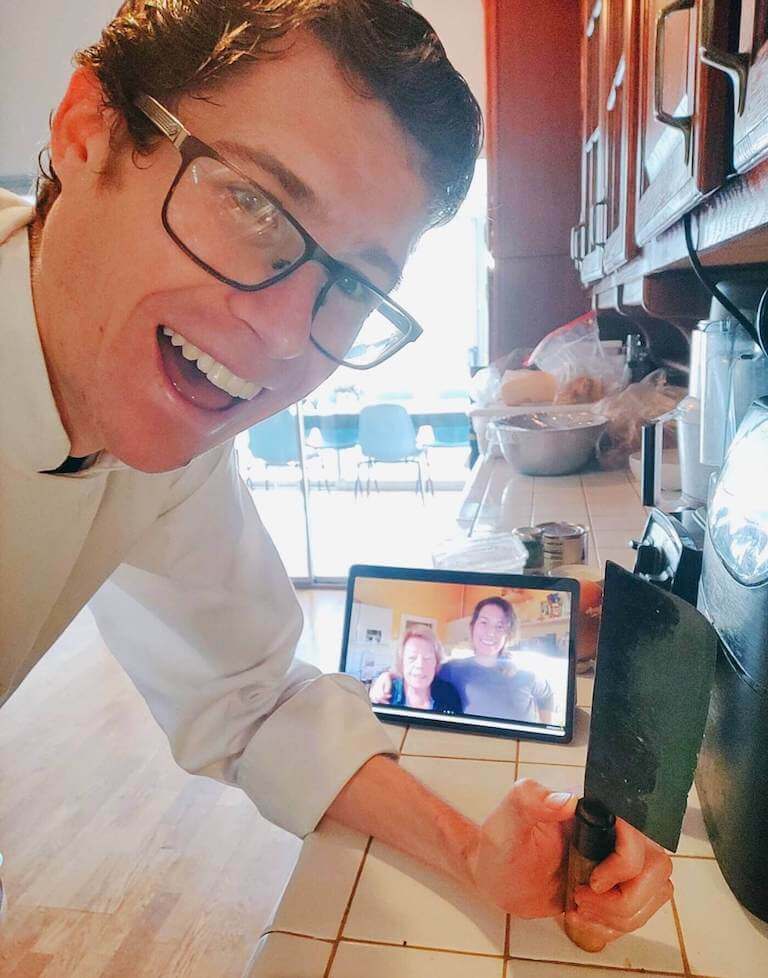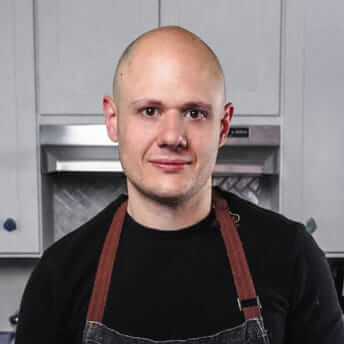Listen to This Article:
When you think of culinary careers, do you picture long days in bustling kitchens, managing the heat, fast pace, and constant demands of restaurant life? While this is one path in the culinary world, it’s far from the only option.
Today’s tools—from live streaming to social media and virtual collaboration—make it easier than ever to build a fulfilling culinary career beyond the traditional kitchen walls, whether that means teaching online classes, developing recipes from home, or traveling to capture stunning visuals of dishes.
If you’re passionate about food but long for a career that fits your lifestyle, one of these remote culinary jobs could be just the career for you.
1. Craft Culinary Masterpieces as a Recipe Developer
Recipe developers use their technical expertise and creativity to develop innovative dishes for others to replicate. It’s not just about cooking the food; the role requires meticulous documentation of the process, making it an easy recipe for others to follow.
Professional recipe developers can find themselves in a wide range of work environments. Some professionals work for large corporations, where they spend more time in lab-like settings experimenting with recipes for new packaged food lines. However, many work with smaller operations such as restaurants, artisan food manufacturers, and media outlets. This often allows the recipe developer the flexibility to work from a home kitchen.
A significant part of the job requires recipe developers to do a great deal of research learning. They may focus on learning about past culinary approaches and cultural influences that can guide them in their creations. After that, it’s all about experimentation—creating and refining the ingredients and process until it’s just right.

Food stylists use tools like blowtorches to perfect dishes for photography, ensuring every detail looks flawless.
For those working remotely, it’s essential to have a well-equipped home kitchen. Professional grade tools and equipment can make a significant difference in both the quality and consistency as you experiment with and test recipes.
On average, recipe developers can earn around $53,418 annually based on their specialized skills and creativity.
2. Turn Your Expertise into Stories as a Food Blogger or Writer
If you enjoy sharing your culinary insights and creativity through words, being a food writer or blogger is a flexible and rewarding remote opportunity. You can work from anywhere in the world, and all you need is a laptop and your imagination to get started.
There are two primary paths to get started in this field:
Start a Food Blog
Blogging allows you to create your own content while potentially earning income through affiliate marketing, ads, and possibly merchandise and products. Some bloggers feature kitchen equipment with links that they make money on if people choose to purchase it. Others may develop their own products like recipe cards or cookbooks for followers to buy.
The beauty of a career as a food blogger is that you get to decide what topics you want to write about, whether it’s sharing recipes, reviewing restaurants, or providing home cooking tips. You have the freedom to choose a focus for your blog.
For example, Escoffier student Amy Kimoto-Kahn started a food blog called Easy Peasy Japanesey to share her Japanese culture and cooking with others. The blog also launched her culinary career, including the publication of two cookbooks.
The average salary for a food blogger is $62,275 annually, making it a viable career option if you enjoy combining your culinary knowledge and writing. However, keep in mind that it takes time to build a website that can generate income. Many food bloggers start out with a blog as a side hustle until they’ve grown their readership.
Work as a Freelance Food Writer
While food bloggers write in their own voice and on their own platforms to generate income, freelance food writers seek opportunities to get paid for writing for other individuals or companies, such as established blogs and magazines. Some freelance writers secure long-term contracts with clients, while others work on a project-by-project basis.
Being a freelance culinary writer requires food expertise and top writing skills. You must also dedicate time to finding work and carefully managing client deadlines.
The requirements for the job will vary based on your clients. For example, some clients might prefer for you to have a culinary education, as it can help give you the language and history required to describe food and culinary traditions thoroughly.
3. Share Your Knowledge as an Online Chef Educator
Chefs who love to share their knowledge with others can find a fulfilling and lucrative career as chef educators. Thanks to live video platforms like Zoom and Google Meet, chef educators can guide students, provide real-time feedback, and create an interactive environment from the comfort of their home kitchen.
There are several ways to pursue this career path:
1. Teach for a Formal Online Culinary Program – Chefs can choose to become instructors for accredited culinary schools offering online programs. At Auguste Escoffier School of Culinary Arts, we have dozens of skilled Chef Instructors who teach our online courses remotely, sharing their expertise while having the flexibility to work from their home kitchens.
2. Create Pre-Recorded Cooking Tutorials – Online platforms like Craftsy and YouTube allow chefs to share their skills with a broad audience, making money on things like ads and royalties on course sales. Escoffier Chef Instructor Colette Christian has a number of courses available on Craftsy where she shares her skills in Danish pastries, classic croissants, and her specialty—macarons.
3. Host Live Online Classes for Private Groups – Personalized cooking classes online are an excellent way to connect with small groups or individuals to provide private instruction with the convenience of remote learning. Escoffier graduate Shane Witters Hicks teaches personalized cooking classes to small groups through video. His classes are uniquely tailored to the group’s preferences and dietary restrictions.

Chef Shane Witters Hicks teaching a virtual cooking class
4. Make Every Bite Picture-Perfect as a Food Stylist
Food stylists transform dishes into works of art that look as delicious as they taste. They prepare food to look its best for photoshoots, commercials, cookbooks, movies, and social media. While this is traditionally a job that requires professionals to be onsite, there is a growing opportunity for stylists to work remotely.
Food styling requires technical precision and creativity to create visually stunning dishes, whether it’s a decadent dessert for an advertisement or a home-cooked meal for a blog. The demand for food stylists is growing as brands and content creators rely on scroll-stopping images to engage their audiences.
Remote opportunities in this field are expanding with collaborations with food photographers, marketing teams, and food brands. Proper lighting conditions, props, and an equipped home studio can allow food stylists to work from their own kitchens. With modern technology, stylists can prepare food in their own kitchens and collaborate with clients through live video for feedback.
While culinary training isn’t required for this career, it can help food stylists understand how to work with different textures, colors, and plating techniques. While the average salary of food stylists is $62,500 annually, building a strong portfolio and network can be essential in helping you create a steady income, especially when trying to work remotely.
5. Curate Culinary Success as a Menu Consultant
Menu consultants use their expertise to help restaurants and food businesses create profitable and appealing menus. They design dishes that align with a brand’s identity and customer preferences while maximizing operational efficiency. This work can include refreshing existing menus, creating innovative seasonal offerings, or launching a new concept.
As a menu consultant, your work expands beyond the kitchen. You may conduct market research, analyze food costs, and provide guidance on where to outsource ingredients. Having a culinary education or restaurant management experience can help in this field.
Menu Design Best Practices
To create menus that are both effective and appealing, consider these best practices used by successful menu consultants:
- Focus on Popular Dishes: Use strategic placement to highlight high-demand menu items.
- Use Visual Cues: Incorporate appealing fonts, colors, and images to draw attention to profitable dishes.
- Limit Options: Keep the menu concise to reduce decision fatigue and improve operational efficiency.
- Consider Pricing Psychology: Use techniques like omitting dollar signs or listing prices in descending order.
- Prioritize Readability: Organize the menu with clear categories and avoid overcrowding.
- Reflect the Brand: Ensure the menu aligns with the restaurant’s theme and target audience.
Using these strategies and tools, menu consultants can significantly impact a restaurant’s success, whether working in person or remotely.
6. Capture Culinary Art as a Food Photographer
Have you ever flipped through a magazine and found your mouth watering as you gazed at an image of a vibrant poke bowl with colorful layers of fresh tuna, avocado, and sesame seeds? You likely have a food photographer to thank for those irresistible hunger pangs.
Through their lens, food photographers capture the artistry and appeal of dishes, turning meals into striking visual narratives. Their images may be found in magazines, social media, cookbooks, restaurant promotions, and advertising.
While food stylists focus on preparing and arranging food to make it look its best, food photographers bring those efforts to life through skillful use of lighting, composition, and technical photography techniques. Both roles often collaborate closely, but the photographer’s expertise lies in translating the stylist’s work into an image that tells a story.
Many in this field can work remotely, and some even work in home studios. With the right equipment—cameras, tripods, lighting, and props—this career isn’t necessarily location-dependent.
Social media platforms like Instagram and Pinterest have helped open doors for food photographers to build their own brands by sharing their work globally.
Culinary arts knowledge can be an asset for food photographers because it can enhance their understanding of ingredients, plating, and presentation.
7. Become a Taste-Maker as a Food Critic
Do you love discovering new flavors and dining experiences? Food critics explore, evaluate, and share their opinions and experiences with food, restaurants, and culinary trends to provide insights into the culinary world. Their opinions and findings can influence public opinion and help guide readers’ dining decisions, from fine dining establishments to hidden gems.
Traditionally, food critics worked for newspapers or magazines, but today, social media and blogs have expanded the reach and accessibility of food critique. Many critics now build and connect with an audience through platforms such as YouTube, Instagram, and TikTok.
These steps can help you launch a career as a food critic.
- Build Culinary Knowledge: Learn cooking techniques, flavor profiles, and food presentation.
- Hone Writing Skills: Practice descriptive, engaging reviews to capture the dining experience.
- Gain Industry Experience: Work in food-related roles to deepen your expertise.
- Leverage Social Media: Use platforms like Instagram and YouTube to share reviews and grow your audience.
- Be Consistent: Publish regularly and maintain authenticity to build trust.
A typical day may involve tasting, observing, and sharing about food, as well as the ambiance, service, and dining experience. But it’s more than just about enjoying food; it requires a deep understanding of culinary techniques, flavor profiles, and presentation. So, a background in culinary arts can be an advantage and help a critic establish authority in the industry.
8. Guide Clients to Better Health as a Nutrition Coach
Do you have a passion for helping others live healthier, more vibrant lives through the power of food? Nutrition coaches help individuals improve their health and well-being through informed food choices. They create personalized meal plans to provide detailed guidance on macro and micronutrients, helping clients achieve their health goals.
As a nutrition coach, you can help clients improve their health, and well-being and potentially reach goals that were previously out of reach.
What’s the Difference Between a Nutrition Coach, Nutritionist, and Registered Dietitian?
Each role serves different client needs, from general wellness to medical treatment.
- Nutrition Coach: Helps clients improve overall wellness through healthier food choices. No specific education is required, but certifications are common.
- Nutritionist: Focuses on addressing specific health issues with food and nutrition. Education requirements vary by state and may include advanced degrees and certification.
- Registered Dietitian (RD): The most qualified role, treating medical conditions and specializing in areas like eating disorders. Requires a Master’s degree, supervised practice, and passing a licensing exam.
While some nutrition coaches work in person, they can also communicate with clients by phone, email, or video call to assess their needs and provide them with meal plans or dietary advice. So, this career is perfect for the remote worker or digital nomad.
9. Build a Following as a Culinary Content Creator or Influencer
If you have a knack for storytelling or design, being a food influencer could be an exciting career path to explore. Unlike teaching structured classes, culinary content creators focus on building a personal brand and crafting content that engages and inspires food enthusiasts. The culinary content creation field continues to grow and evolve with more opportunities for creative culinarians to build an online business.
Food businesses are eager for online attention to expand their reach through engaging content, leveraging blogs, videos, podcasts, social media, and more. Content creators often experiment with trending topics, unique visual styles, and authentic storytelling to stand out in a crowded online space.
Platforms like TikTok and YouTube have become more integral to connecting with audiences, allowing creators to reach a broader audience of food enthusiasts.
If you like to create content but don’t want to put yourself out there, you can also create content for food businesses or marketing firms that work in the culinary space. Someone with skills in Adobe Illustrator could specialize in attractive infographics, for example. This type of career blends culinary creativity with marketing savvy, which can be a fun balance of left-brain and right-brain work.
10. Help Businesses Solve Problems as a Research Chef or Chef Consultant
Chef consultants and research chefs are problem-solvers who help food businesses overcome challenges to achieve their goals. The role requires creativity and adaptability, whether it involves creating new products, increasing efficiency, developing menus, training staff, or executing a host of other tasks. The work is often project-based, allowing chefs to tackle new tasks frequently while building industry connections and expanding their network.
For example, Escoffier graduate Chris McAdams works as the Director of Research & Development at Culinary Culture, a consulting group that helps food and beverage businesses test new products, supplies, and recipes as well as trains staff and helps launch new menus.. His role shows how research chefs can combine culinary expertise with a mission-driven approach.
Research chefs often spend much of their time on the computer, so much of their work can be done remotely. Even if they have to be onsite part of the week, they may be good candidates for a flexible work situation.
Whether you’re passionate about sustainability, product development, or operational excellence, a career as a research chef or consultant offers an exciting and ever-evolving way to impact the culinary world.

Menu consultants can research trends and analyze data remotely, making this a flexible and creative career option.
Modern Technology Has Revolutionized Culinary Careers
While many culinary careers still revolve around the bustling commercial kitchen that many chefs thrive in, evolving technology has continued to open up exciting possibilities for culinarians looking for a different option. Tools like live streaming, social media, and collaborative platforms make it easier to work remotely in ways that weren’t possible in the past.
Whether you’re teaching cooking lessons from home, developing recipes for food brands, or creating content for a global audience, the culinary career landscape continues to offer more flexibility than ever before. Just like how you can attend culinary school online from almost anywhere, you can also build a culinary career from almost anywhere.
Establishing a strong culinary foundation is the key to getting started. Explore Escoffier’s culinary degrees and diplomas to find the program that can help you turn your passion into a rewarding career.
TO LEARN MORE ABOUT CULINARY CAREERS, READ THESE ARTICLES NEXT:
- How to Become a Chef: The Complete Guide
- 15 Culinary Careers Outside of the Kitchen
- Which Culinary Career Is Right For You? 5 Tips for Choosing a Career in Food
This article was originally published on October 8, 2021 and has since been updated.




